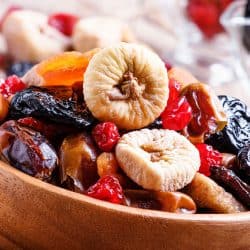There are proper ways to store produce. If you do not put it away correctly, it's prone to spoiling faster. To get more specific, have you wondered if you can keep fruit in the pantry? If that is the issue you are curious about, we have researched the matter and found some answers.
You can store fruit in the pantry. However, there are some fruits you should avoid mixing. Fruit makes up the majority of ethylene producers. Ethylene is a natural plant hormone that helps fruit ripen. In this case, you should keep fruits like bananas separate from others such as apples.
Of course, you might want to know the specifics of what we are discussing. What is ethylene gas? What is the produce to look out for? Is there a way to keep them all in the pantry without one ruining the other? If you would like to know this and more, keep reading ahead.
![Two jars of assorted fruits on a wooden chopping board, Can You Keep Fruit In The Pantry? [How To Properly Do So]](https://kitchenseer.com/wp-content/uploads/2021/07/Can-You-Keep-Fruit-In-The-Pantry-How-To-Properly-Do-So-667x1000.png)
Keeping Fruit In The Pantry
So, what can you and can not mix when it comes to storing fruit in the pantry? As mentioned before, fruit makes up the majority of ethylene producers. The amount a fruit produces varies. Some can release more of this hormone than others can.
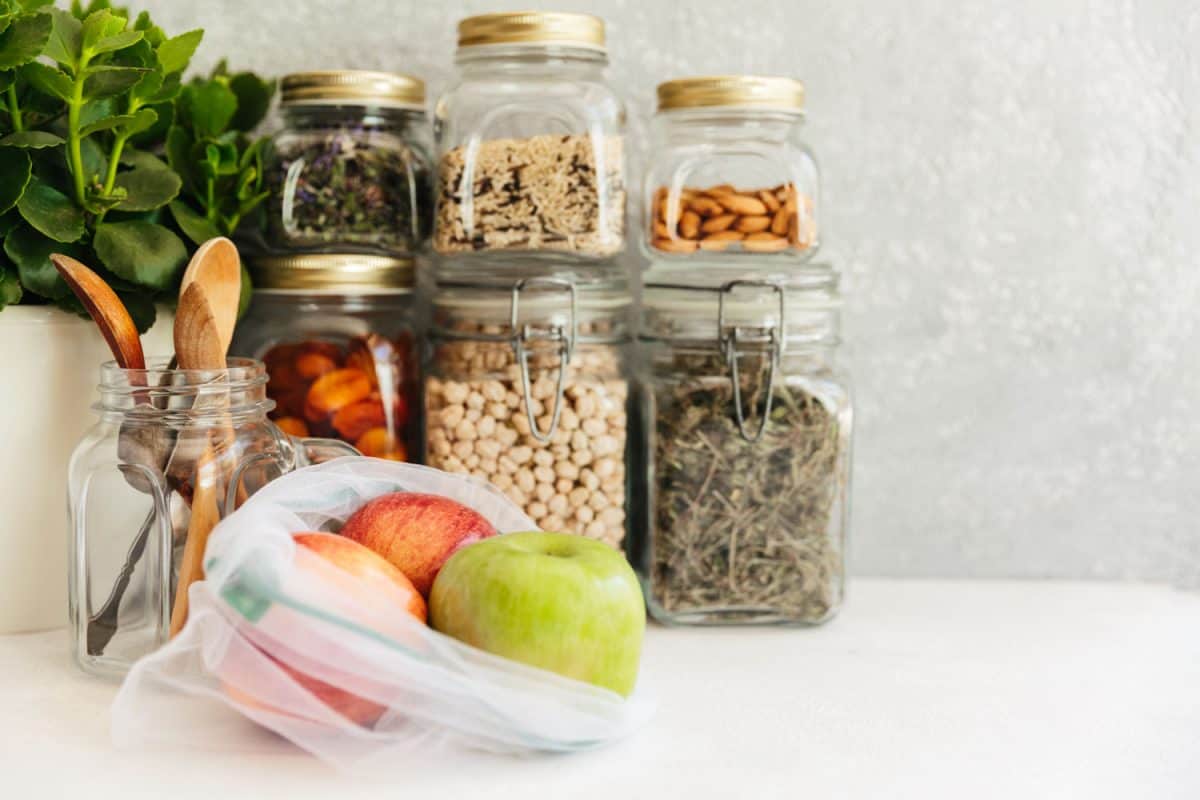
However, there are a few exceptions to this rule. You can categorize watermelon and unripe bananas as ethylene-sensitive produce. What does this mean, you might ask. It means that if you were to store watermelon with bananas, for example, the watermelon would spoil quicker.
Typically, uncut watermelon can last 7-10 days at room temperature. If a large ethylene producer is present, it can spoil in 4-5 days. So, how can we tell which fruit produces more gas?
Fruit Classification
Climacteric Fruit
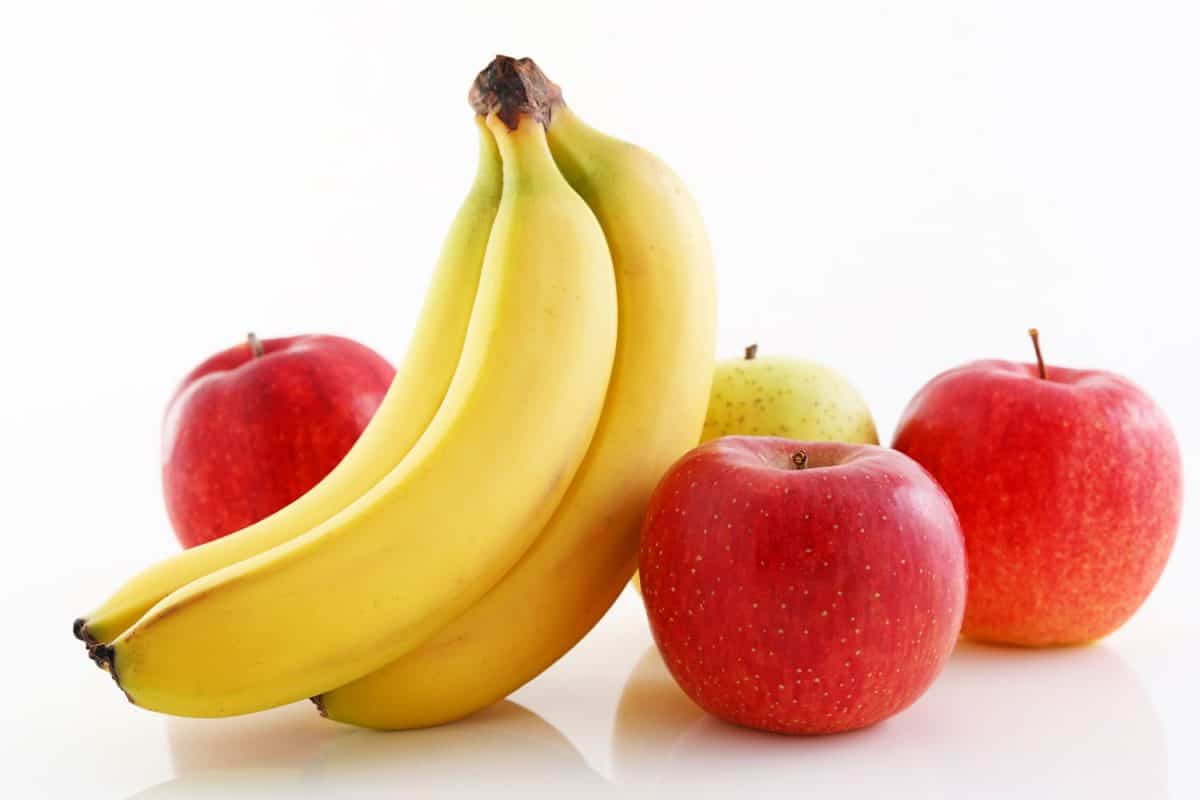
You can group fruits into two categories: climacteric and non-climacteric. Climacteric fruits are fruit that can ripen as soon as you pick them off their respective stem. On the other hand, non-climacteric fruits can not ripen after being taken from the plant.
You may have heard of a trick to ripen fruits faster. It requires you to place fruit in a paper bag. The reason many recommend this process is because it concentrates ethylene, making fruit ripen quicker.
The following is a list of climacteric fruits to look out for:
- Apple
- Banana
- Mango
- Pear
- Avocado
- Apricot
These fruits produce a large amount of ethylene. They are also sensitive to it. If you want to store these in the pantry, it is best to keep them separate from each other. You should keep them in a separate bowl, away from sunlight and far apart from each other. With these considerations in mind, they can last from 5-7 days.
After 5-7 days, you can refrigerate them to last a little longer. Now, there are also large ethylene producers that you can store together. These are the following fruits:
- Nectarines
- Plums
- Peaches
While they may produce a lot of ethylene, they are not too sensitive to it. If you want to store these fruits in the pantry, you can place them in the same bowl/container.
Non-climacteric
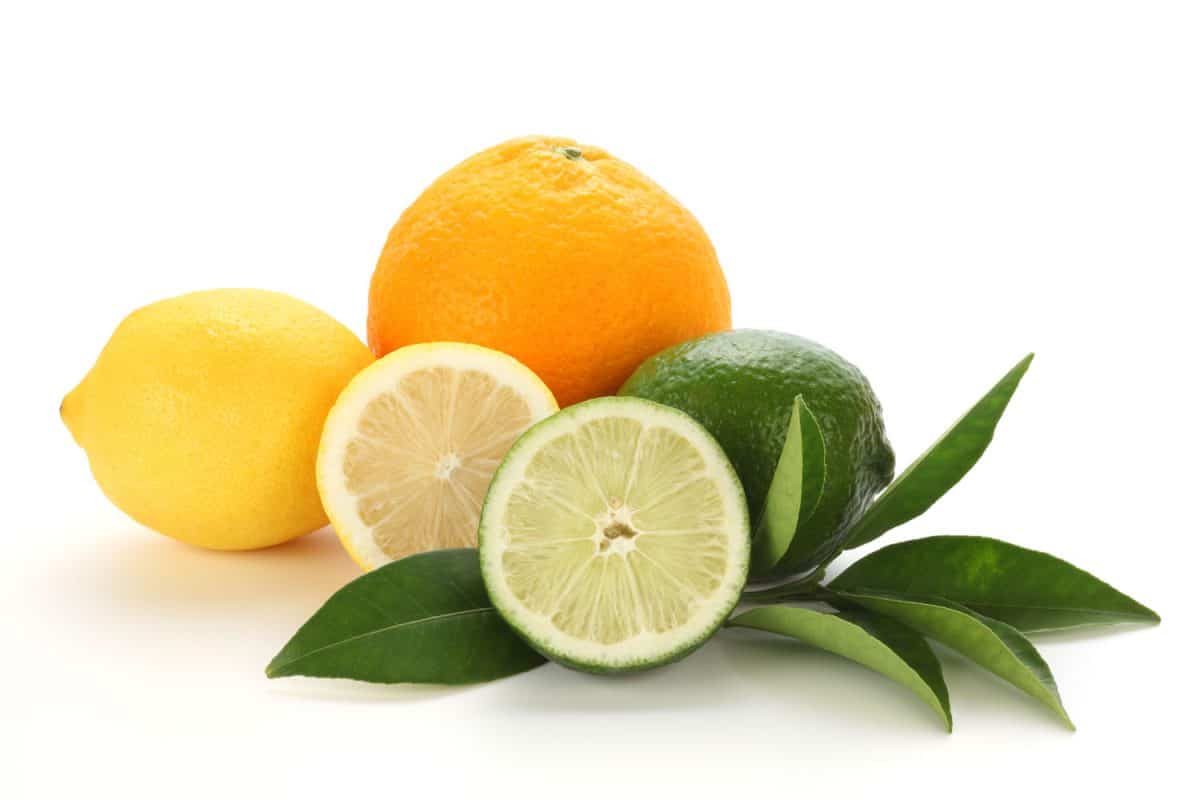
Non-climacteric fruit, as stated before, are a fruit that cannot ripen after being removed from the plant. They do most of their maturing before making their way to your pantry! Most are not sensitive to ethylene. Non-climacteric fruits also do not produce too much of it. In general, you can store them together.
The following is a list of non-climacteric fruit that you can keep together:
- Berries like strawberries, raspberries, etc. (Blueberries and blackberries are climacteric fruit)
- Cherries
- Citrus fruits like lime, lemon, and oranges
- Pineapples
Quick Recap
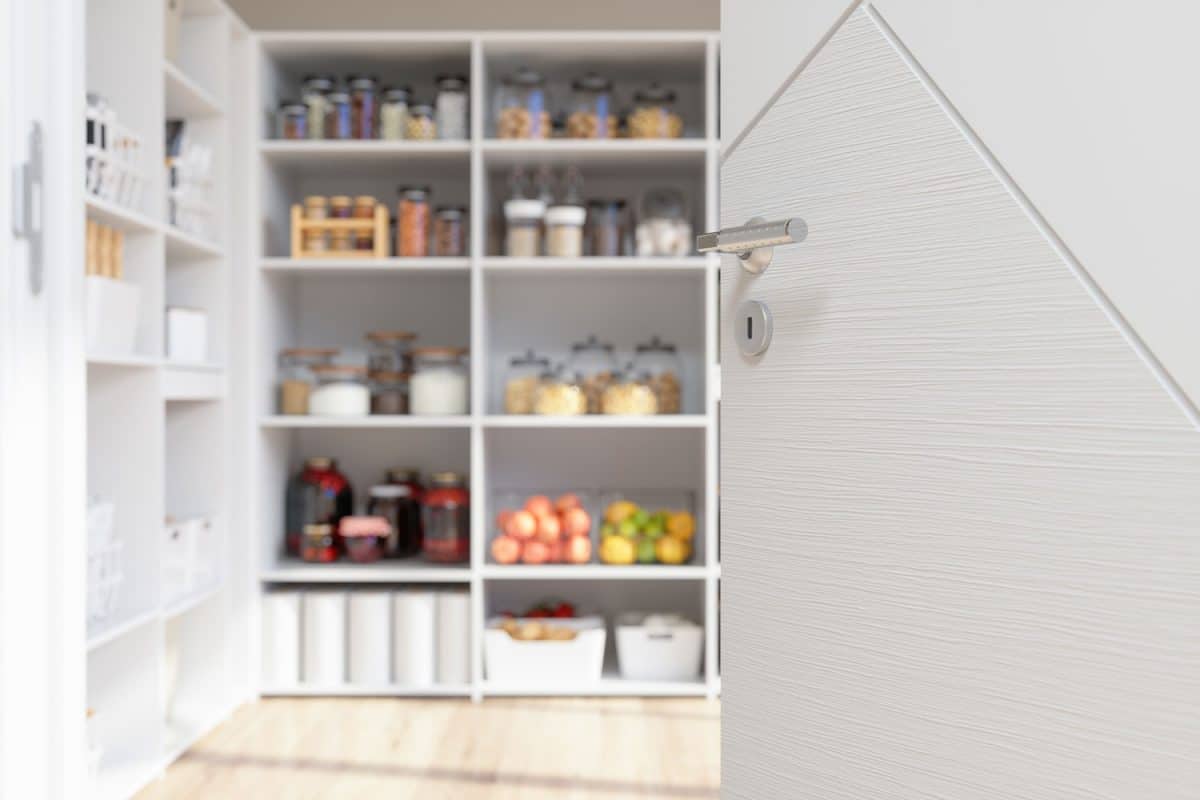
In general, if you want to store climacteric fruit in your pantry, keep them separate. If you wish to refrigerate the fruit, it is best to wait until it is ripe. Some suggest keeping the fruit at room temperature until the fruit is mature enough. Once mature, refrigerate it as needed.
Non-climacteric fruits cannot ripen after you remove them from the plant. Most produce small amounts of ethylene. They also are not affected much by it. You can keep these fruits together.
Another aspect to keep in mind: do not wash the fruit before storing it. Instead, store it in the pantry right away and wash it when you need to use it. Washing before storing creates an environment where it will cause the fruit to spoil. It creates an environment that will promote bacterial growth. Lastly, keep the fruit away from sunlight.
What is the best way to store fresh fruit?
Although you can store fresh fruit in the pantry at room temperature, there is more to consider if you want the fruit to last. Most fruit will last longer if you keep it in the fridge. However, some exceptions need to ripen before they can enter the fridge. If you store them before they can, they can get freezer burn and not develop a good flavor and texture.
Here is some fruit that you can leave in the pantry for a week before storing it in the fridge:
- Apricots
- Mangoes
- Bananas
- Papaya
- Peaches
- Plums
Once they ripen, they can last from a week up to four weeks in the fridge. So if you want to get the most out of your fruit, leave them out until it is time to move them in.
Where Should You Store Bananas?
Bananas are a tropical fruit that you often find rotting faster than you can consume. They are delicate. However, they have their ways of storage. First things first, you should leave bananas at room temperature. This way, it will give them enough time to ripen.
It is essential to keep note that they should stay separate from other fruits. A great way to get this done is by hanging them on a banana tree/hangers. This method helps avoid bruising the fruit. You should also keep them away from sunlight.
Click here to see this hanger on Amazon.
Lastly, if you want to reduce how quickly they ripen, you can wrap the stems in plastic wrap. Once they reach the right flavor and texture, you can store them in the fridge. Of course, make sure they stay away from other produce that is sensitive to ethylene.
Do Mason Jars Keep Fruit Fresh?
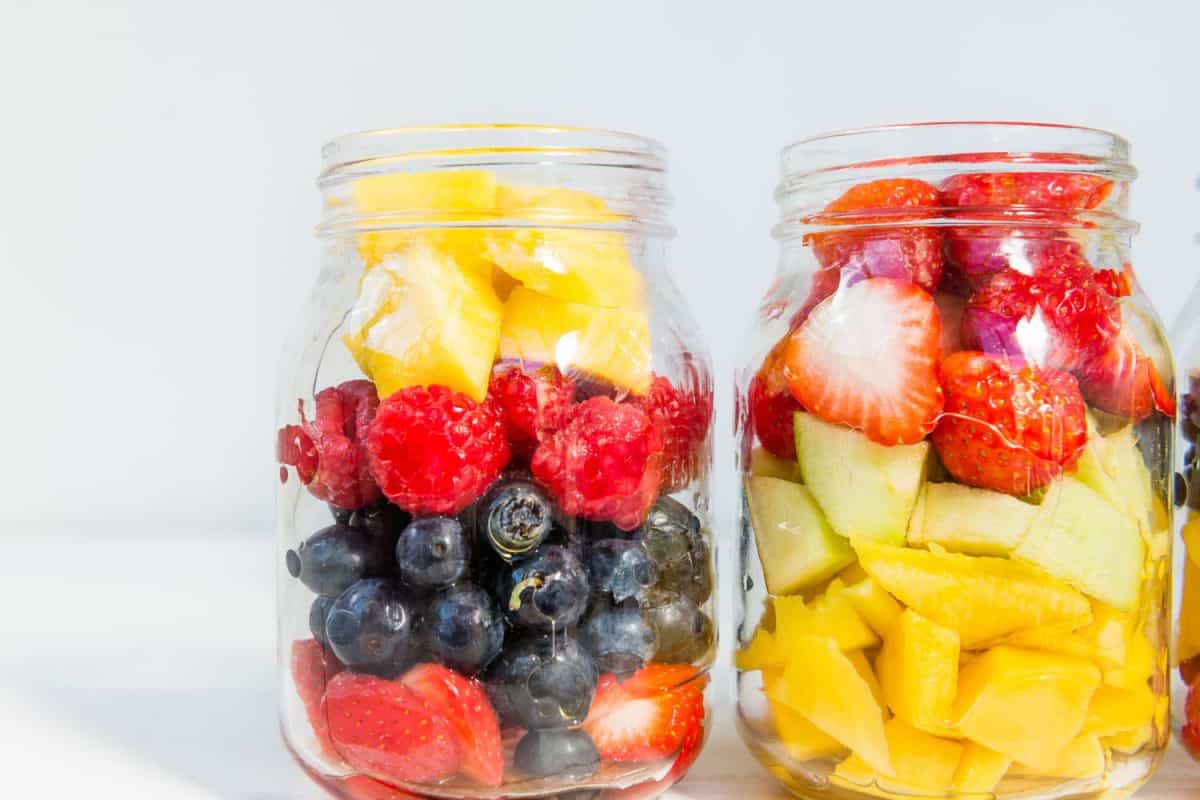
You might find tips online that claim mason jars are great for storing fruit! The reasoning behind this is because mason jars are airtight. Since they're airtight, it slows down the process for bacterial growth, keeps moisture out, and minimizes contamination. Those who have used this method reported that the produce did last longer than storing it in plastic or its original packaging.
Click here to see these mason jars on Amazon.
However, there are a few aspects to keep in mind. The mason jar should be clean itself. Additionally, if you wash your fruit before storing them in the mason jar, you should allow the fruit to dry completely first.
Is It Better To Store Fruit In Glass Or Plastic?
Tying all the information we have gathered together, this question depends on usage. In a perfect world, we would be on top of our duties and store fruit in a proper container every time. But, that is not always the case. You can keep fruit using plastic. However, you must not leave it in storage for too long as it will quickly rot.
If you plan to consume the fruit in a few days, it is okay to leave it in its original packaging. Some suggest you keep fruits like grapes in their breathable bags until you are ready to use them. Otherwise, store them in an airtight glass container to keep them fresh longer.
Final Takeaway
We have gone over all you need to know about storing fruit. If we take the proper precautions, we can eliminate as much food waste as we can. No longer will you have to suffer fruit rotting before you get to consume them!
Before you go, do you have other concerns? How about charcuterie boards? If you are wondering how big they should be, check out our post here.
What about blenders? Find yourself in a situation where you are without one? We can offer advice on some alternatives. Check out our post here. Until next time!



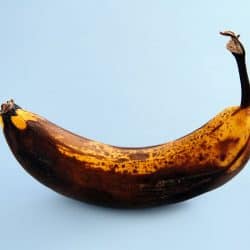
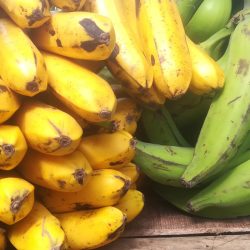
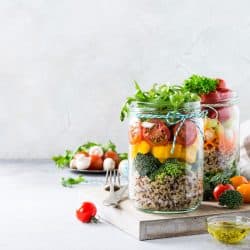
![A contemporary classic kitchen renovation remodeling featuring a pantry storage shelf and maple cabinet, What is the Standard Size of a Pantry? [By Pantry Type]](https://kitchenseer.com/wp-content/uploads/2020/09/A-contemporary-classic-kitchen-renovation-remodeling-featuring-a-pantry-storage-shelf-and-maple-cabinet-250x250.jpg)
